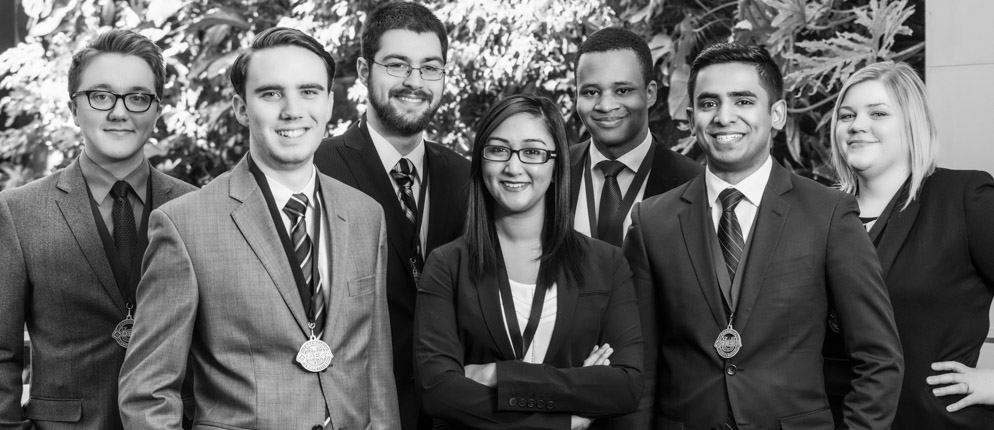- Future Students
- Current Students
- Faculty
- Staff
- Alumni
- Others
UofGH students take home top prizes from Canada’s largest undergrad business conference
University of Guelph-Humber business students won five medals at this year’s DECA U provincials, including the top case prize.
1st Place - Deloitte Case Boss Challenge:
Michael Legosz, 3rd year
Tomson Varghese, 3rd year
Jaylen McCurbin, 4th year
1st Place - Restaurant & Food Services Management
Daniel Angus, 3rd year
2nd Place - Accounting
Cassandra Hull, 4th year
2nd Place - Retail Management
Thomas Kerby, 3rd year
1st Place - Human Resources Written Exam
Hannah D'Silva, 3rd year
 From left to right: Michael Legosz, Thomas Kerby, Daniel Angus, Hannah D'Silva, Jaylen McCurbin, Tomson Varghese, Cassandra Hull.
From left to right: Michael Legosz, Thomas Kerby, Daniel Angus, Hannah D'Silva, Jaylen McCurbin, Tomson Varghese, Cassandra Hull.
In claiming the prizes, they edged out students from 18 other post-secondary schools, including Queens, McMaster, UofT, Western, Waterloo, and Laurier.
DECA U is an international association of business students, whose members compete in business case competitions. At this year’s provincial conference, about 1400 students from across Ontario competed in individual and team challenges in areas such as marketing management, social entrepreneurship, accounting, and financial services.
Case Boss Challenge
Teams were given a case, and a month to prepare. This year’s question: How can global firms overcome the big data challenge?
Michael Legosz: “We each researched various aspects – first, understanding emerging technologies, understanding what sectors it applies to, finding out where it’s been applied, where it hasn’t.”
Tomson Varguese: “Our solution deals with cognitive computing – it’s a system that uses artificial intelligence. It’s very innovative, and has been growing. We analyzed the various sectors that currently use this technology, looking at results within the healthcare sector, finance and public sectors. We then dove deeper into the healthcare sector and looked at the number of deaths due to chronic illness, problems with early detection –”
Michael continues: “In looking at a doctor’s processing, we found that diagnostics took the longest amount of time. It could take months for a cancer diagnosis, as an example. It’s a serious problem. So that’s what we wanted to focus on – cutting down the diagnostics time.
We found that an average doctor would go through 64 variables to diagnose a patient. That includes symptoms, family history, the patient’s history, clinical findings, medications, etc. But the average human mind can only process 10 variables of data at once. And that’s where this technology could be helpful.”
Watson, IBM cognitive computing software, is what the team chose to present as its solution. Essentially a tool to help doctors make more effective and efficient diagnoses.
Jaylen McCurbin: “The judges seemed to like how we arrived at our solution – in how we’d implement through strategy, tech, human capital, [we showed] risks and mitigation strategies.”
They all laugh when asked about the moment the winning teams were announced.
“It was crazy,” says Tomson. “Our entire chapter of 94 students got up and started cheering. We trained like there was no tomorrow. It’s a really great win.”
Jaylen adds: “UofGH is a smaller community [than other universities]. People like us want to have an impact – which is why we came to Guelph-Humber. We have huge pride – I think that really helped us through.”

